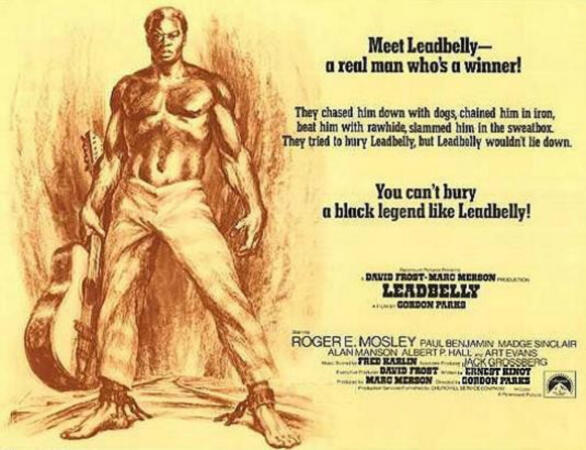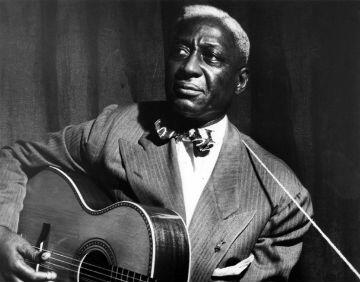
No need to be embarrassed if you’ve never heard of Gordon Parks’ film “Leadbelly”. Practically no one has; not even the person the film is based on, so you can be almost forgiven. “Leadbelly”was first released 40 years ago in 1976, and barely received any kind of national attention. On top of that, the film has never been on top of anyone’s “must see” list, and that would be a shame since it is perhaps Parks’ finest film.
After considerable success as a filmmaker starting in 1969 with his film “The Learning Tree,” based on his semi-autobiographical novel of the same name, and the first Hollywood studio backed (Warner Bros) film made by a black director, the famed renaissance man, after a few years, built enough clout to direct his long cherished dream project about the legendary blues/folk singer Huddie William Ledbetter, known as Leadbelly (though Ledbetter himself always separated the two words, calling himself Lead Belly – something that most people did not).
Born in Louisiana on a plantation around 1889, to say that Leadbelly lived a hard life would be putting it mildly. He started as a teenager performing as a singer and musician in the red light districts around Louisiana. However, he had a notoriously violent temper, and throughout his life, was arrested and sent to prison several times – even ten years before his death – for various assaults, attempted murder and murder charges.
It was during one of these times in prison, in the early 1930’s, when folk song collectors John Lomax and his son Alan came across Leadbelly, and started recording him, eventually making hundreds of recordings, and even helped to get him released.
After that, Leadbelly struggled and failed to become a success in New York and elsewhere, attempting several comebacks, but failing, until the early 40’s, when the folk song craze finally raised his profile. He became a popular performer across the country, appearing as a regular on radio shows, performing in concerts, nightclubs, while creating more music, until his death in 1949.

Parks’ film only tackles the early years of Leadbelly (very well played by Roger E. Mosley), his struggles facing racism in the South, and his prison terms, while also finding his voice, which was shaped by his rough environment and experiences. Deliberately paced with an extraordinary attention to detail despite its limited budget, it’s intentionally without a strong central narrative. Instead, the film is a series of separate incidents and anecdotes, shaping the character of Leadbelly – a black man trying to survive in a hostile world. The brilliant final scene shows a prematurely graying Leadbelly, once again part of a prison chain gang, but still defiant, vowing that he will never be broken in mind and spirit.
One common mistake which is usually written about “Leadbelly” though, is that it was the last film directed by Parks; it wasn’t. His last film was actually the 1984 PBS TV movie “Solomon Northrup’s Odyssey” with Avery Brooks playing Northrup, which was the first version of book later remade as “12 Years a Slave” directed by Steve McQueen.
Unfortunately, Paramount really didn’t know what to do with “Leadbelly.” Although they financed it, they obviously had second thoughts about releasing a film that they thought would be a tough sell at the time – a period film about a blues singer in the South. One can imagine the execs saying to themselves, “How in the hell can we sell this film, and who would want to see it?”
As a result, “Leadbelly” barely received a release, only opening in a few cities, on a few screens. Although the few reviews the film got were very positive, including Roger Ebert, who gave it three-and-a-half stars. And since its initial release, “Leadbelly” has fallen into obscurity. There may be some unauthorized DVDs out there – almost certainly made from old prints and in the wrong aspect ratio; but Paramount has never officially released the film on any home video format, including the old VHS.
The one likely possibility is that specialty DVD labels like Olive Films, who have released a number of Paramount films from the 1960’s to mid-70’s that were previously unreleased on DVD, might have a planned blu-ray in the works. One can only hope.
Below is a scene from the film which is based on a real incident in which Leadbelly is forced to sing for the entertainment of the governor of Texas for a possible pardon.
And here’s a recording of Leadbelly singing “Where Did You Sleep Last Night?”
